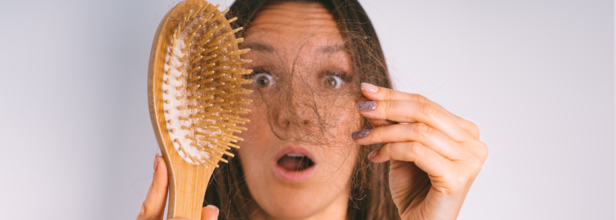
Image Credit: Canva
Hair Fall Myths Debunked: What Actually Works To Prevent Breakage
Everyone wants long, lustrous, and healthy hair. However, when it comes to the sheer volume of advice-from age-old remedies to modern tips-it's easy to get lost in myths, especially while trying to prevent breakage during humid seasons like monsoon or struggling to keep up with a nourishing haircare routine during the dull and dry hair in winter. Though it's natural to try hair care techniques to fight the effect of weather, not all advice is equal. In fact, some might even do more harm than good for your hair.
Here is an expert's guide to simply separate fact from social media "facts" and provide actionable tips to promote healthier hair, ensuring you know what really works and what doesn’t.
Your hair is not just strands; it's a form of self-expression. Through colors, cuts, and styles, it reveals personality, mood, or even major life transitions. This universality makes hair loss a sensitive topic that cuts across age, gender, and cultural lines. Yet, misconceptions abound. With an endless stream of online advice and opinions from well-meaning friends or family, distinguishing truth from myth can feel overwhelming.
Common Causes of Hair Loss
According to Dr. Akshay Batra, Trichologist, "hair loss is not strictly genetic"; it can result from several factors as stated by the doctor:
1. Hormonal Imbalance: An imbalance in hormones causes a condition such as androgenetic alopecia. Men experience a receding hairline, while women notice thinning at the crown. The only way to maintain hair health is by correcting these imbalances.
2. Nutritional Deficiency: There are nutrients such as iron, zinc, and vitamin B12 that are essential for hair. Research has shown that if these are lacking, it can weaken the hair roots, causing excessive shedding.
3. Scalp Infections: Dandruff, fungal infections, or eczema inflames the scalp, making it a hostile environment for hair growth.
4. Alopecia Areata: This autoimmune disease leads to patchy hair loss, mainly in the scalp, eyebrows, and beard.
Each of these causes points to a need to focus on root issues rather than superficial fixes.
Debunking Common Hair Myths
Myths about hair care often lead to misguided practices. Let's tackle some of the most prevalent ones:
Myth 1: Hair Oil Reduces Hair Fall
Fact: Hair oil moisturizes the scalp and reduces dryness, but doesn't prevent hair fall if the cause is an imbalance in hormones or nutritional deficiencies. Overuse can even make problems like dandruff worse.
Myth 2: Cutting Hair Promotes Growth
Fact: Hair growth is controlled by the health of the follicle, not by the length of the hair. Trimming can minimize split ends, which gives the appearance of healthier hair but does not affect growth rates.
Myth 3: Shampoo Can Prevent Hair Fall
Fact: Shampoos cleanse the scalp but cannot treat internal causes of hair loss. Choosing a gentle shampoo with a balanced pH can support scalp health, but expecting it to stop hair fall is unrealistic.
Myth 4: Biotin Alone Is a Cure-All
Fact: Biotin is just one of the several important nutrients for hair health. Hair loss can also be due to deficiencies in iron, zinc, or vitamin D, and no single supplement can be a silver bullet.
Myth 5: Lemon Juice Eliminates Dandruff
Fact: The acidity in lemon juice can cause irritation on sensitive scalps, making dandruff worse in some cases. Scalp care requires gentler, more balanced solutions.
Myth 6: Onion Juice Works for Everyone
Facts: Onion juice is highly prized for the presence of sulfur content, which is supposed to strengthen hair, though continued application irritates the scalp. This is very person-specific and condition-specific in terms of hair issues.
Can Homeopathy Give Hair Fall Long-Term Solutions?
While myths often claim a quick-fix solution, an enduring resolution is found by dealing with an internal imbalance. That's where homeopathy excels. Dr Akshay emphasises, "Homeopathy addresses the root cause of hair loss, which can be through hormonal imbalances, infection of the scalp, or stress."
- Customized Solution: Homeopathy is one of the few treatments for hair fall that will address issues based on each individual's specific trigger.
- Stress Management: Stress is a silent yet powerful contributor to hair loss. Homeopathic remedies like Ignatia and Natrum Mur not only alleviate stress but also promote emotional well-being.
- Improved Scalp Circulation: Certain homeopathic medicines enhance blood flow to hair follicles, nourishing them and encouraging regrowth.
- No Side Effects: Unlike harsh chemical treatments, homeopathy offers gentle solutions without adverse effects.
Practical Tips for Healthier Hair
Adding mindful practices to your daily life can complement homeopathic care and greatly improve hair health:
- Massage with Natural Oils: Coconut and argan oil are perfect for hydrating and nourishing the scalp.
- Choose the Right Products: Use sulfate-free shampoos and moisturizing conditioners that cause less damage.
- Avoid Heat Damage: Avoid using styling tools such as straighteners and curling irons.
- Be Gentle with Hairstyles: Tight ponytails or braids can stress hair, causing breakage.
- Eat a Balanced Diet: Foods rich in protein, iron, zinc, and vitamins (like leafy greens, nuts, and whole grains) bolster hair health.
Emotional well-being is critical to hair health. Undervalued stress can impact hormonal balance and lead to loss of hair. Taking the time for relaxation through activities such as yoga, meditation, or even a couple of minutes each day, can really make a difference. Healthy, resilient hair isn't the result of one miracle product or method; it's a culmination of smart choices, consistent care, and addressing root causes.
Hair strong, beautiful: it is not a sprint but a marathon. It's about finding out what works for you and sticking with it. Because your hair is unique like you are, it deserves to reflect the best self in the world.
Dr. Akshay Batra is a Trichologist and is an expert (B.H.M.S.) in Homeopathy at Dr. Batra's Clinic In India
© 2024 Bennett, Coleman & Company Limited

